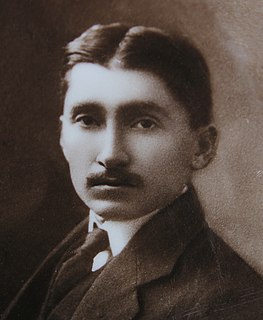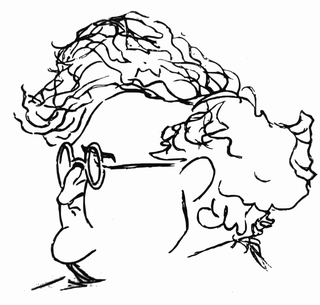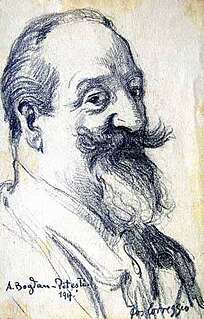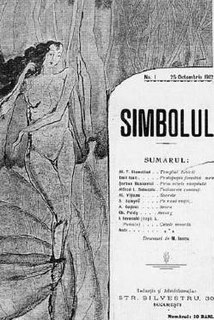
Tristan Tzara was a Romanian and French avant-garde poet, essayist and performance artist. Also active as a journalist, playwright, literary and art critic, composer and film director, he was known best for being one of the founders and central figures of the anti-establishment Dada movement. Under the influence of Adrian Maniu, the adolescent Tzara became interested in Symbolism and co-founded the magazine Simbolul with Ion Vinea and painter Marcel Janco. During World War I, after briefly collaborating on Vinea's Chemarea, he joined Janco in Switzerland. There, Tzara's shows at the Cabaret Voltaire and Zunfthaus zur Waag, as well as his poetry and art manifestos, became a main feature of early Dadaism. His work represented Dada's nihilistic side, in contrast with the more moderate approach favored by Hugo Ball.

Marcel Janco was a Romanian and Israeli visual artist, architect and art theorist. He was the co-inventor of Dadaism and a leading exponent of Constructivism in Eastern Europe. In the 1910s, he co-edited, with Ion Vinea and Tristan Tzara, the Romanian art magazine Simbolul. Janco was a practitioner of Art Nouveau, Futurism and Expressionism before contributing his painting and stage design to Tzara's literary Dadaism. He parted with Dada in 1919, when he and painter Hans Arp founded a Constructivist circle, Das Neue Leben.
The Vilna Troupe, also known as Fareyn Fun Yiddishe Dramatishe Artistn and later Dramă şi Comedie, was an international and mostly Yiddish-speaking theatrical company, one of the most famous in the history of Yiddish theater. It was formed in and named after the city of Vilnius (Vilna) in the Russian Empire, later capital city of Lithuania. Distinctly Modernist, and strongly influenced by Russian literature and by the ideas of Konstantin Stanislavski, their travels in Western Europe and later to Romania played a significant role in the dissemination of a disciplined approach to acting that continues to be influential down to the present day.

Benjamin Fondane or Benjamin Fundoianu was a Romanian and French poet, critic and existentialist philosopher, also noted for his work in film and theater. Known from his Romanian youth as a Symbolist poet and columnist, he alternated Neoromantic and Expressionist themes with echoes from Tudor Arghezi, and dedicated several poetic cycles to the rural life of his native Moldavia. Fondane, who was of Jewish Romanian extraction and a nephew of Jewish intellectuals Elias and Moses Schwartzfeld, participated in both minority secular Jewish culture and mainstream Romanian culture. During and after World War I, he was active as a cultural critic, avant-garde promoter and, with his brother-in-law Armand Pascal, manager of the theatrical troupe Insula.

Urmuz was a Romanian writer, lawyer and civil servant, who became a cult hero in Romania's avant-garde scene. His scattered work, consisting of absurdist short prose and poetry, opened a new genre in Romanian letters and humor, and captured the imagination of modernists for several generations. Urmuz's BizarrePages were largely independent of European modernism, even though some may have been triggered by Futurism; their valorization of nonsense verse, black comedy, nihilistic tendencies and exploration into the unconscious mind have repeatedly been cited as influential for the development of Dadaism and the Theatre of the Absurd. Individual pieces such as "The Funnel and Stamate", "Ismaïl and Turnavitu", "Algazy & Grummer" or "The Fuchsiad" are parody fragments, dealing with monstrous and shapeshifting creatures in mundane settings, and announcing techniques later taken up by Surrealism.

Bóly is a town in Baranya county, Hungary.

Perpessicius was a Romanian literary historian and critic, poet, essayist and fiction writer. One of the prominent literary chroniclers of the Romanian interwar, he stood apart in his generation for having thrown his support behind the modernist and avant-garde currents of Romanian literature. As a theorist, Perpessicius merged the tenets of Symbolism with the pragmatic conservative principles of the 19th century Junimea society, but was much-criticized over perceptions that, in the name of aesthetic relativism, he tolerated literary failure. Also known as an anthologist, biographer, museologist, folklorist and book publisher, he was, together with George Călinescu, one of his generation's best-known researchers to have focused on the work of Junimist author and since-acknowledged national poet Mihai Eminescu. Much of Perpessicius' career was dedicated to collecting, structuring and interpreting Eminescu's texts, resulting in an authoritative edition of Eminescu's writings, the 17-volume Opere ("Works").

Cernat is a commune in Covasna County, Romania composed of three villages:

Alexandru Bogdan-Pitești was a Romanian Symbolist poet, essayist, and art and literary critic, who was also known as a journalist and left-wing political agitator. A wealthy landowner, he invested his fortune in patronage and art collecting, becoming one of the main local promoters of modern art, and a sponsor of the Romanian Symbolist movement. Together with other Post-Impressionist and Symbolist cultural figures, Bogdan-Pitești established Societatea Ileana, which was one of the first Romanian associations dedicated to promoting the avant-garde and independent art. He was also noted for his friendship with the writers Joris-Karl Huysmans, Alexandru Macedonski, Tudor Arghezi and Mateiu Caragiale, as well as for sponsoring, among others, the painters Ștefan Luchian, Constantin Artachino and Nicolae Vermont. In addition to his literary and political activities, Alexandru Bogdan-Pitești was himself a painter and graphic artist.

Simbolul was a Romanian literary and art magazine, published in Bucharest between October and December 1912. Co-founded by writers Tristan Tzara and Ion Vinea, together with visual artist Marcel Janco, while they were all high school students, the journal was a late representative of international Symbolism and the Romanian Symbolist movement. Other figures associated with the magazine were Adrian Maniu, Emil Isac and Claudia Millian, the wife of poet and Tzara's mentor Ion Minulescu. Simbolul also featured illustrations by, among others, Janco and his teacher Iosif Iser.

N. D. Cocea was a Romanian journalist, novelist, critic and left-wing political activist, known as a major but controversial figure in the field of political satire. The founder of many newspapers and magazines, including Viața Socială, Rampa, Facla and Chemarea, collaborating with writer friends such as Tudor Arghezi, Gala Galaction and Ion Vinea, he fostered and directed the development of early modernist literature in Romania. Cocea later made his name as a republican and anticlerical agitator, was arrested as an instigator during the 1907 peasant revolt, and played a leading role in regrouping the scattered socialist clubs. His allegiances however switched between parties: during World War I, he supported the Entente Powers and, as a personal witness of the October Revolution, the government of Soviet Russia, before returning home as a communist.

The Symbolist movement in Romania, active during the late 19th and early 20th centuries, marked the development of Romanian culture in both literature and visual arts. Bringing the assimilation of France's Symbolism, Decadence and Parnassianism, it promoted a distinctly urban culture, characterized by cosmopolitanism, Francophilia and endorsement of Westernization, and was generally opposed to either rural themes or patriotic displays in art. Like its Western European counterparts, the movement stood for idealism, sentimentalism or exoticism, alongside a noted interest in spirituality and esotericism, covering on its own the ground between local Romanticism and the emerging modernism of the fin de siècle. Despite such unifying traits, Romanian Symbolism was an eclectic, factionalized and often self-contradictory current.
A name in Romanian consists of a given name (prenume) and a surname. In official documents, surnames usually appear before given names.
Cernat may refer to several entities in Romania:

Ion Vinea was a Romanian poet, novelist, journalist, literary theorist, and political figure. He became active on the modernist scene during his teens, his poetic work always indebted to the Symbolist movement, and first founded, with Tristan Tzara and Marcel Janco, the review Simbolul. The more conservative Vinea drifted apart from them as they rose to international fame with the Dada artistic experiment, being instead affiliated with left-wing counterculture in World War I Romania. With N. D. Cocea, Vinea edited the socialist Chemarea, but returned to the international avant-garde in 1923–1924, an affiliate of Constructivism, Futurism, and, marginally, Surrealism.















